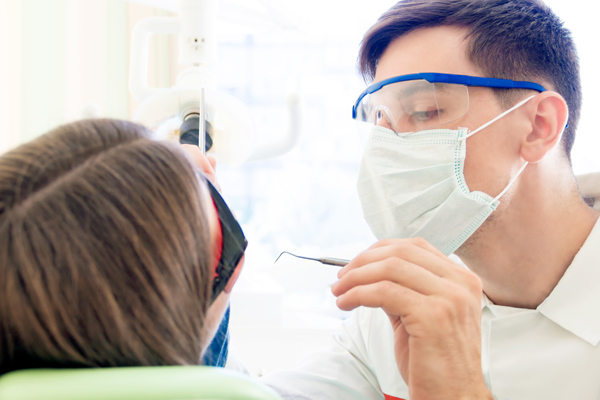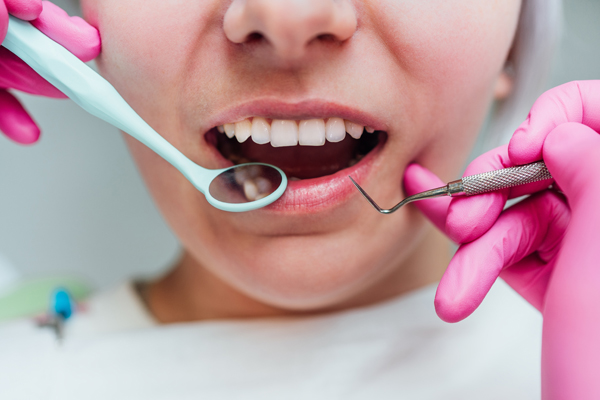TMJ Treatment Options From Your Dentist

If you experience soreness or pain in the jaw, you may want to talk with your dentist about TMJ treatment and whether the condition is causing your pain or other issues. Temporomandibular joint dysfunction (TMJ) is a serious condition that causes stiffness in the joints of the jaw, pain, soreness, swelling, and loss of movement. It is also called Lockjaw.
Do not worry if you find yourself with this disorder; there are several ways that your dentist can treat the condition, depending on the root cause of the condition. Though it can be very severe and serious, dentists are experts in dealing with conditions that affect the jaw.
Realigning the jawbone
Sometimes the cause of Lockjaw is that the jaw is simply out of alignment. This can be caused by an injury or a strong blow to the jaw, in which the jaw is knocked loose from the joints that hold it in place. This would cause intense pain and inability to move the jaw. Treatment, in this case, is quite simple; the dentist will manually reposition the jawbone into the proper place.
This simply means that the dentist will reach into the patient's mouth with their hands, find the location of the jawbone, and put it back into the socket. Patients usually see relief immediately and can manage the symptoms with over-the-counter medications.
Solving the underlying cause
Sometimes TMJ is not caused by a problem with the jaw but is indirectly caused by another issue affecting the jaw. In these cases, identifying and fixing the root cause is the best course of treatment.
One of the most common causes of Lockjaw unrelated to the jaw is clenching or grinding of the teeth, particularly at night. You see, clenching the jaw and grinding the teeth puts an incredible amount of pressure on the jawbone for long periods of time. This can eventually cause soreness and swelling that can limit the total movement of the jaw. To fix the condition, the dentist will prescribe a special night guard that will prevent clenching and grinding, thus taking the pressure off the jawbone and eliminating the disorder's symptoms over time.
Botox injections
You might think that Botox is just for removing wrinkles and making skin look younger, but when it comes to joint dysfunction, it is a valuable tool. Sometimes, it is caused by tightening the muscles around the jaw joint. This tightening can eventually paralyze the jaw, leaving it stuck in the open or closed position if untreated.
That is why Botox is such an important treatment. Injecting Botox into these muscles actually causes them to loosen up, making the jaw able to move as normal again. This is a very effective solution to fix the issue. Another option is surgery on the muscles around the joints.
Talk with your dentist today about treating a jaw joint dysfunction
Losing the ability to move your jaw can be devastating. If you start noticing symptoms affecting your jaw, it is best to get to your dentist immediately. The longer you wait, the harder it will be to treat the condition. With the help of your dentist, they will be able to identify the cause of your situation and use the most effective treatment.
Request an appointment here: https://www.pacifichorizondentalarts.com or call Pacific Horizon Dental Arts at (714) 260-0763 for an appointment in our Placentia office.
Check out what others are saying about our dental services on Yelp: TMJ in Placentia, CA.
Recent Posts
TMJ pain makes it difficult for people who are affected to speak and eat.Fortunately, the condition, which affects over three million people, can be treated.The temporomandibular joint is a joint that acts like a hinge that connects the jawbone to the skull, with one on each side of the jaw. Temporomandibular joint and muscle disorder…
If you have TMJ disorder, Temporomandibular Joint Disorder, you may be interested in learning some tips from a TMJ dentist on how to make treatments more effective. TMJ disorders cause a wide array of uncomfortable symptoms that can be treated by a professional. There are a few basic steps to employ to make TMJ disorders…
Learning about some of the more commonly used oral surgery procedures allows dental patients to understand more about any procedures that can improve their dental health. Updated dental technologies allow dental surgery to be quick and safe, giving patients peace of mind. Know that a general dentist can typically perform certain types of surgical procedures.With…
Oral surgery is often necessary to remove impacted teeth. A tooth is said to be impacted if it fails to emerge fully through the gum tissues because something inhibited its eruption, such as bone, malocclusion, cysts, dense soft tissue or other teeth. This problem is common with wisdom teeth, usually because there is no longer…


